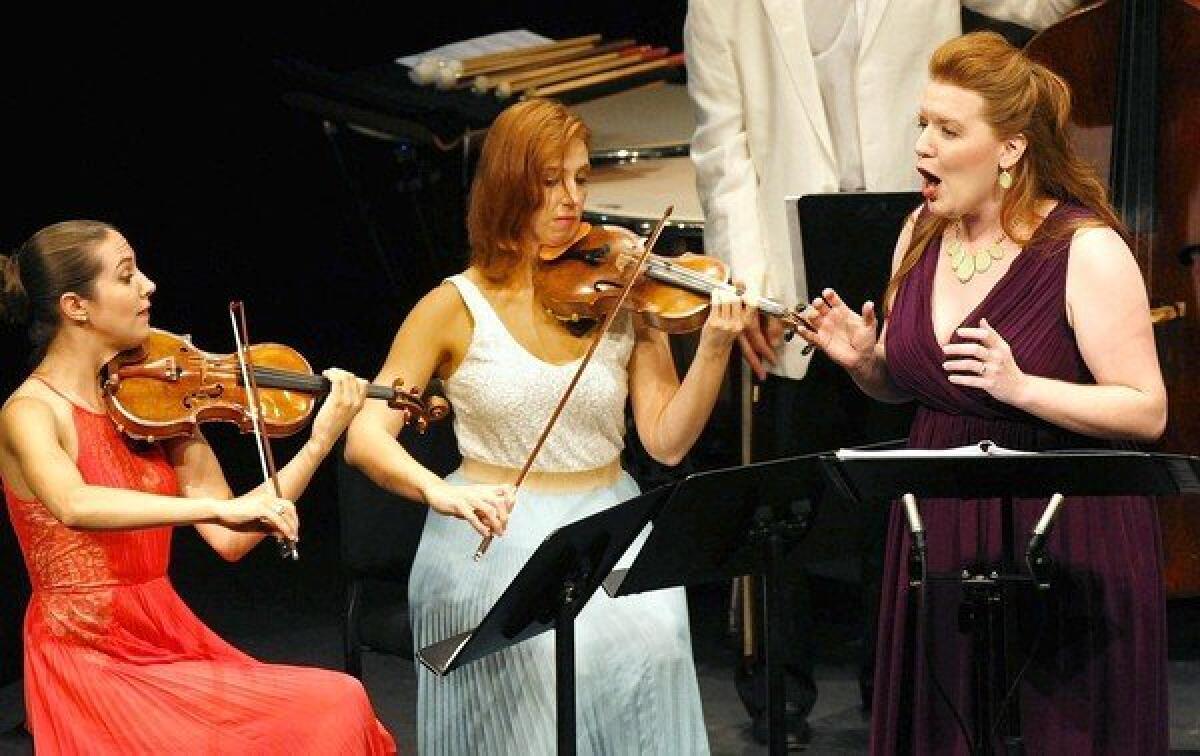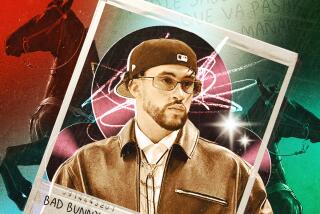Review: Master musical minds have a lot to say at SummerFest

LA JOLLA — SummerFest, one of the country’s most significant chamber music festivals, devoted its annual program of new work Friday night at Sherwood Auditorium in the Museum of Contemporary Art here to three American masters. The composers — Steven Stucky, David Del Tredici and John Harbison — are major figures and had never before appeared together on a program. Their works had something to say.
But the one thing the evening wasn’t happened to be what it was called: “Musical Crossroads.” The composers (in their 60s and 70s) have been based throughout their distinguished careers on the East Coast; all use a traditional musical language; all have won Pulitzer Prizes.
Seeing what is on the mind of three major musical minds is, of course, an excellent theme for a program, and the premieres only became a problem when looked at in the context of this summer’s SummerFest at large. Nowhere will you find music by women or by composers outside the United States and Europe (other than a token nod to Latin America).
TIMELINE: Summer’s must see concerts
That said, “Musical Crossroads” was not in itself irrelevant to our time or place. Del Tredici happens to be a native of Northern California and a UC Berkeley graduate. André Previn, while music director of the Los Angeles Philharmonic in the 1980s, appointed Harbison and Stucky as composers-in-residence of the orchestra, and Stucky’s association with the L.A. Phil continued throughout Esa-Pekka Salonen’s 17 years as music director.
Stucky’s Southern California connection remains particularly strong. Next summer, the Ojai Festival will premiere his opera based on, of all things, Charles Rosen’s “The Classical Style,” an erudite study of the music of Haydn, Mozart and Beethoven. And Stucky’s new piece, a sonata for violin and piano that opened Friday’s program, did indeed hark back to the classical style.
Best known as a vibrant orchestral colorist and as a composer with an imaginative sense of musical form and gesture, Stucky seems to have followed the example of such notable 20th century predecessors as Debussy, Stravinsky, Schoenberg and Morton Feldman of adopting a late-period neo-Classicism. His sonata’s first movement judiciously balances dramatic and lyric themes. The third movement delights the ear with its spiky, sneaky opening, but it too has the character of a classical scherzo.
The short, slow middle movement is the odd heart of the work, however. An elusive melodic line in the violin hints at emotion perhaps too intense for notes and rhythms. If classical, this is the visionary late-Beethoven version of classical. The performance by violinist Cho-Liang Lin (SummerFest’s artistic director) and pianist Jon Kimura Parker was life-affirming.
PHOTOS: Arts and culture in pictures by The Times
Also neo-Classical, Del Tredici’s “Bullycide” proved even more life-affirming. But what made the piece special was that both those qualities seemed at first encounter counterintuitive.
The composer’s inspiration was a sequence of suicides by gay teenagers who had been bullied. Perhaps Del Tredici had hoped to curb painful memories of his own experiences with bullying as a teen (which he described in his program note) by choosing a classical model, Schubert’s “Trout Quintet,” as his starting place. But as a composer of gloriously over-the-top pieces based on “Alice in Wonderland,” Del Tredici has never been one for holding back.
And there was simply no stopping Del Tredici in “Bullycide.” He needed at least one more instrument than Schubert, so he added violin along with the string, bass and piano. He begins the piece with a hook, a thrillingly good tune and writes as though he can’t bring himself to let go of it. A fugue that follows sets the pulse racing.
A litany of names of the dead teens, read by the musicians in ghostly voice, is ghoulish but somehow deeply sweet. Rage is released by overplaying on muted strings in a section titled “Strangled Voices.” But Del Tredici refuses to take off his glitter while mourning, as if the way to wound the bullies were to dazzle and daze them with bright light. It is a brilliantly effective score, and it got an exuberant performance from the Shanghai Quartet, pianist Orion Weiss and bassist DaXun Zhang.
On the other hand, Harbison’s “Crossroads” (hence the evening’s title) — a setting of three poems by Louise Glück for mezzo-soprano (Jennifer Johnson Cano), oboe (Peggy Pearson), string quartet (the Linden) and bass (Nico Abondolo) — is as restrained as “Bullycide” is animated. The texts are about loss and are more oblique than direct. Harbison sets them without fuss, true to Glück’s disturbingly direct poetic style. The meaning appears beneath the surface.
Harbison introduces each poem with the same instrumental interlude, but each time it feels as if there is more music in it. This is typical of a composer who rarely makes a strong first impression and rarely fails to make a strong second or third one. This score needs to be lived with.
The concert ended with an effective performance of Bartók’s Sonata for Two Pianos and Percussion. Joyce Yang was the excitingly flashy young first pianist while Joseph Kalichstein was the grounded, mature second one; the pairing reminded me of the recording by Bartók and his wife. The fine percussionists were Markus Rhoten and Steven Schick. With Bartók, you know where you are going. There are no stop signs at his intersections. Crossroads are crossed via an intricate route, from being spooked at first to dancing the night away by the end.
More to Read
The biggest entertainment stories
Get our big stories about Hollywood, film, television, music, arts, culture and more right in your inbox as soon as they publish.
You may occasionally receive promotional content from the Los Angeles Times.







